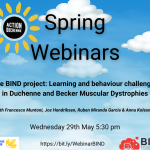AAV-Mediated Restoration of Dystrophin-Dp71 in the Brain of Dp71-Null Mice: Molecular, Cellular and Behavioral Outcomes
Vacca, O.; Zarrouki, F.; Izabelle, C.; Belmaati Cherkaoui, M.; Rendon, A.; Dalkara, D.; Vaillend, C. AAV-Mediated Restoration of Dystrophin-Dp71 in the Brain of Dp71-Null Mice: Molecular, Cellular and Behavioral Outcomes. Cells 2024, 13, 718. https://doi.org/10.3390/cells13080718
Lay Summary
The research article titled “AAV-Mediated Restoration of Dystrophin-Dp71 in the Brain of Dp71-Null Mice: Molecular, Cellular and Behavioral Outcomes” explores a potential therapeutic approach for Duchenne Muscular Dystrophy (DMD), a severe genetic disorder characterized by progressive muscle degeneration and weakness. This study focuses on the Dp71 protein, a smaller form of dystrophin that is particularly crucial for brain function.
Duchenne Muscular Dystrophy (DMD) is caused by mutations in the dystrophin gene, leading to the absence of the dystrophin protein. While the primary symptoms of DMD are related to muscle deterioration, patients also experience cognitive and behavioral issues, suggesting that dystrophin has a role in the brain. The Dp71 isoform of dystrophin is highly expressed in the brain, and its absence in mice has been linked to cognitive and behavioral deficits. The objective of this study was to investigate whether gene-therapy tools could restore Dp71 in the brain and improve some deficits in a mouse model lacking Dp71.
The researchers used a virus (AAV) to deliver Dp71 into the brains of Dp71-null mice, either at birth or adulthood. The study found that this gene therapy successfully restored Dp71 protein levels in the brains of Dp71-null mice, which also restored other associated proteins that are important for maintaining cell structure and signaling. However, the treated mice did not show noticeable improvements in behavioral tests.
The study provides compelling evidence that restoration of Dp71 in the brain can be achieved using gene therapy methods and identifies key indicators to estimate the efficiency of such treatment. in severely affected DMD patients. The findings highlight the potential of gene therapy as a treatment not only for the muscle-related symptoms of DMD but also for its behavioral aspects.








